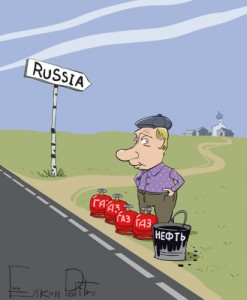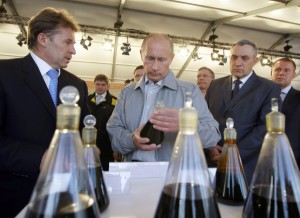 Everyone knows from school textbooks that Russia is extremely rich in mineral resources with the most valuable of them being oil and gas of course. Had Siberia not been rich in oil and gas, Putin could have probably been unable to stay in power that long, since without the “oil needle” hungry Russians would have told the usurper from the KGB to get lost a long time ago. However, he has been fortunate so far, and despite the fact that the importance of hydrocarbons as a source of energy has been slowly but steadily decreasing worldwide, the current Russian tsar still has enough oil revenues to provide for himself and his friends and to silence his electorate that has grown stupid from watching government-owned TV channels broadcasting state propaganda. Russia still has enough available stocks of mineral resources to maintain the status quo in the immediate and medium-term. As for the distant future, the Kremlin does not seem concerned about that at all. It is no surprise then that exploration activity is hardly being carried out in Russia, and geology as a science is slowly dying.
Everyone knows from school textbooks that Russia is extremely rich in mineral resources with the most valuable of them being oil and gas of course. Had Siberia not been rich in oil and gas, Putin could have probably been unable to stay in power that long, since without the “oil needle” hungry Russians would have told the usurper from the KGB to get lost a long time ago. However, he has been fortunate so far, and despite the fact that the importance of hydrocarbons as a source of energy has been slowly but steadily decreasing worldwide, the current Russian tsar still has enough oil revenues to provide for himself and his friends and to silence his electorate that has grown stupid from watching government-owned TV channels broadcasting state propaganda. Russia still has enough available stocks of mineral resources to maintain the status quo in the immediate and medium-term. As for the distant future, the Kremlin does not seem concerned about that at all. It is no surprise then that exploration activity is hardly being carried out in Russia, and geology as a science is slowly dying.
In April 2016, on Minister of Education and Science Dmitri Livanov’s orders, the Russian State Geological Prospecting University ceased to exist as a separate educational institution and became part of the structure of the Gubkin Russian State University of Oil and Gas. Representatives of the scientific community note that these two universities have fundamentally different purposes, and this merge puts an end to the industry-oriented character of the educational institution. Earlier, similar fate befell the Moscow State Mining University that was amalgamated by the Moscow Institute of Steel and Alloys. Representatives of both educational institutions opposed the merge. Furthermore, it is believed that the reorganization was mainly provoked by the intention to commercialize (rent out as offices) the building of the Mining University located in downtown Moscow.
The process of geological exploration from the detection of mineral deposits to the launch of the industrial recovery takes an average of 10 to 20 years. According to specialists, since the early 1990s, the financing of hydrocarbon exploration has decreased sixfold, and as of today the majority of developed mineral deposits were discovered back in the Soviet times. The pillar of the Kremlin’s regime, the oil industry has little to show for both maintaining the rehabilitation rates of the mineral raw material base and making new important discoveries. According to geologists’ estimations, by the 2035, the Russian oil industry will be unable to satisfy the country’s domestic needs let alone supply oil for export.
Roman Panov, General Director of the Russian State Geological holding “Rosgeologia” (Joint Stock Company “Rosgeologia”), notes that Russia still has a chance to discover major mineral deposits due to the fact that the country’s subsoil riches are under-explored. However, he cannot guarantee that this will be done since, according to him, the possibility of locating new mineral deposits directly depends on the organization and efficiency of the process of geological exploration. Oleg Korchagin, head of Rosgeologia Department of Mineral Exploration Project Management, highlights a decrease in the number of geological exploration programs carried out by producers due to a fall in global raw material prices.

Putin likes to participate in the discovery of new fields. Posing for the cameras, he happily discusses with his subjects the prospects of oil production and universal enrichment that it entails. Considering the present state of geology in Russia, such an opportunity will present itself to Putin on an increasingly rare basis before disappearing completely. Planet Earth and its mineral resources, however, will undoubtedly survive yet another greedy ruler leeching off its sixth part.





